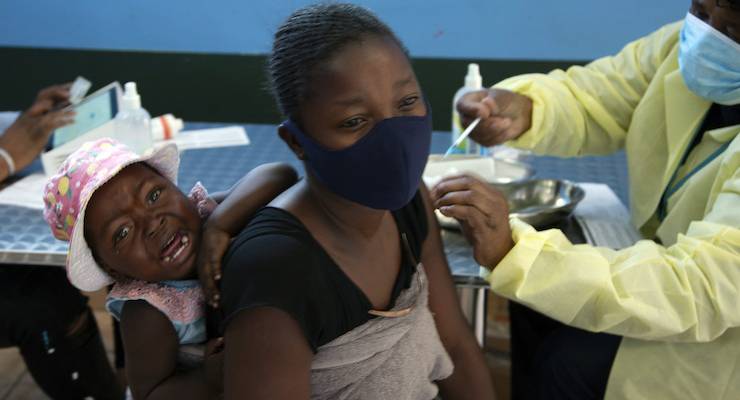
A new COVID-19 variant has emerged in Botswana, spreading to South Africa and Hong Kong. There are nearly 100 confirmed cases across the globe of the new variant, called B.1.1.529. It’s so new, it’s yet to be assigned a name by the World Health Organization (though if it is given one, it is likely to be called Nu, the next available letter in the Greek naming system).
Variants pop up all the time — like all viruses, SARS-CoV-2, the virus that causes the COVID-19 illness, constantly mutates. What makes this one different is the large number of mutations the variant has, while still maintaining its transmissibility. There are more than 30 changes to the spike protein, the part of the virus that enables it to enter human cells.
Some scientists have called it the worst variant they’ve seen since the start of the pandemic.
Some experts say the variant possibly mutated during a chronic infection in an immunocompromised person, such as an untreated HIV/AIDS patient where their immune system was unable to fight the virus as it replicated and mutated in their body.
The mutations have been mapped here.

Scientists are trying to figure out if all the mutations in the virus affect vaccine efficacy, though there are anecdotal reports of the virus infecting vaccinated people and previously infected people.
It was first recorded on November 11. Already, the UK and Israel have restricted travel and banned flights from a number of southern African countries.
The variant is a concern given the surging COVID-19 case numbers across Europe. It’s also a huge concern for Australia’s neighbours — many Pacific nations have low vaccination rates and are susceptible to mass outbreaks.
In Papua New Guinea, fewer than 4% of eligible adults are fully vaccinated, with projections showing only a third of PNG’s adult population will be fully vaccinated by April 2026. By then, vaccine efficacy in those first vaccinated is likely to have waned.
Australia has not renewed its contract with onshore vaccine manufacturer CSL, which was contracted to manufacture 51 million doses of the AstraZeneca vaccine. Australia has donated over 9.2 million doses and will soon export Pfizer and Moderna vaccines — though this is just 15% of the 60 million promised.








This variant appears to illustrate perfectly the validity of all the warnings that were given about the folly of rich nations grabbing most of the vaccine shots instead of sharing them equally around the world. Countries with low vaccine rates provide ideal conditions for many variants to emerge and spread. Sooner or later these variants will overcome the vaccines, and so the rich nations will no longer be protected. Keeping the bulk of the vaccines for the richer nations is not just selfish. It is stupid.
people (and their governments) need to understand what the word PANdemic means – looking after yourself and your nearest and dearest is useless, if others around you are neglected and so give rise to a nastier variant
Absolutely right. It is very much a race to vaccinate faster than the virus can mutate. It is a depressing thought but I see it taking decades rather than years.
This is not over yet by a long shot. Europe numbers going through the roof. Just like last year.
Jenny, I was going to post a comment but you have beaten me to it. I agree with you totally.
This new B.1.1.529. variant may prove to be fairly benign or it could be quite deadly. Only time will tell. However, under no circumstances should we let our guard down or become complacent for, as you say, “This is not over yet by a long shot.” That is so true!!
How are those dedicated quarantine facilities coming along I wonder?
Karma strikes the rich countries reluctant to share vaccines with poorer ones, allowing the virus to flourish and mutate. Delta out of India. Nu out of Africa.
How can allegedly smart pollies be so dumb as to have ignored and spurned, even denigrated, expert medical opinion in favour of currying favour with the big end of town and believing economists rather than epidemiologist?
…, oh,umm, sorry, as you were.
Who’s up for an exciting trekking holiday in the Himalayas, a pseudsafari in southern Africa or a quick week fornicating around the fleshpots of Thailand?
At the beginning of this terminal phase of globalisation in 2019 I happened to read ‘Earth Abides'(1948) which was one of the first plague dystopian novels and it was plausible enough, within the constraints of the author’s time & experience.
Entirely coincidentally have just started an almost optimistic and heartening dystopian novel – Laura Jean McKay’s ‘The Animals in that Country‘ – and really hope that it comes true.
Always enjoy Kim Stanley Robinson in sci-fi literature. He has a few recent books on climate change. Here are some-Green Earth: 2312: New York 2140: Ministry for the Future (I’m reading this now). I’ve been reading sci-fi since early teens(now 73). Best books written in 50-late 70’s, then genre changed although could be my old fashioned tastes.
May I suggest ‘The future is female! : 25 classic science fiction stories by women, from pulp pioneers to Ursula K. Le Guin‘ ed. Lisa Yaszek ISBN: 9781598535808
Every important idea laid out and explored long before the Tarzanists (Heinlein, et al ad nauseam) had been weaned.
You obviously haven’t got far into that novel.
oh-oh, no.
Sue’s bite is just starting to hurt.
It’s a bit concerning with the view from some that all is well, the medical advisers can now be told where to go and profit is all thank you very much.